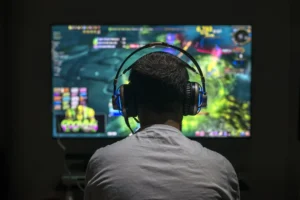The Connection Between Video Games and Creativity
Video games play an influential role in enhancing creativity among young minds. These digital environments offer dynamic experiences that challenge players to think outside the box.
How Video Games Stimulate Creative Thinking
Video games stimulate creative thinking through complex problem-solving activities.
Games like The Legend of Zelda require players to solve intricate puzzles, encouraging innovative approaches.
Sandbox games such as Minecraft allow players to build and explore without limits, fostering imaginative thinking.
In-game storytelling in RPGs (Role-Playing Games) pushes players to make choices that influence the game’s outcome, prompting original thought processes.
Different Types of Games and Their Impact on Creativity
Various game genres uniquely impact creativity:
A. Sandbox Games
- Examples: Minecraft, Terraria
- Sandbox games provide open-world environments where players can create anything, enhancing spatial awareness and design skills.
B. RPGs
- Examples: Skyrim, Final Fantasy
- RPGs immerse players in deep narratives, requiring creative decision-making and character development.
C. Puzzle Games
- Examples: Portal, Monument Valley
- Puzzle games challenge players to solve problems using logic and strategy, enhancing cognitive flexibility.
D. Simulation Games
- Examples: The Sims, SimCity
- Simulation games mimic real-life scenarios, encouraging players to creatively manage resources and scenarios.
These genres collectively nurture different aspects of creativity, helping children develop skills that go beyond gaming into real-world applications.
The Role of Video Games in Child Development

Video games play a significant part in child development. They offer cognitive, emotional, and social benefits that encourage holistic growth.
Cognitive Benefits of Playing Video Games
Video games enhance various cognitive skills. They improve problem-solving abilities, analytical thinking, and memory.
RPGs (role-playing games) exemplify this by challenging players with complex scenarios and strategic decisions.
Puzzle games, like Tetris, enhance pattern recognition and spatial awareness while improving hand-eye coordination.
Studies show children who play video games can develop a better capacity for multitasking and higher mental flexibility.
Emotional and Social Advantages
Video games also have emotional and social benefits. They aid in emotional regulation and stress relief.
Games with narratives, like Life is Strange, engage players emotionally, fostering empathy and perspective-taking.
Multiplayer games, such as Fortnite, enhance social skills by promoting teamwork, communication, and collaboration.
Online gaming communities provide environments for players to build friendships and develop social networks, extending their interactions beyond physical spaces.
These attributes illustrate how video games contribute significantly to child development, proving they’re more than just a source of entertainment.
Case Studies: Success Stories of Gaming and Creativity
Video games drive creativity in unique ways. Below, I delve into academic research and real-life instances highlighting this impact.
Examples from Academic Research
Studies show video games enhance creative abilities. In a 2019 study by the University of Iowa, children who played Minecraft with no instructions showed higher creativity levels measured by established creative thinking tests.
Another research in 2020 by Michigan State University discovered that children engaged in more creative tasks after playing imaginative role-play games like Dungeons & Dragons.
The study involved 491 participants aged 12 to 18 and consistently linked gaming with increased originality and inventive thinking.
Another key study published in the journal Computers in Human Behavior (2017) demonstrated that participants who played puzzle and strategy games like Tetris exhibited improved problem-solving skills and a noticeable increase in creative flexibility.
This study included 352 individuals over eight weeks, showing consistent results across various game genres.
Real-Life Instances Where Gaming Boosted Creativity
Many young creators attribute their success to video games. Markus Persson, the developer of Minecraft, exemplifies this.
His game, based on digital building blocks, inspired millions to create elaborate structures and share their works online.
Persson often mentions how his gaming experiences fueled his creativity and innovation.
Another example is Zach Gage, the developer of innovative puzzle games like:
- SpellTower
- Really Bad Chess
Gage’s background in art and his love for video games combined to produce unique gaming experiences that challenge traditional norms and encourage out-of-the-box thinking.
Gage attributes much of his creativity to the immersive and experimental nature of video games.
In the music world, artists like:
- Megan Thee Stallion
- Travis Scott
actively engage with video games, bringing their creative processes into digital spaces.
Their interactive concert in Fortnite broke traditional barriers, showing how gaming can merge with and amplify artistic creativity.
These examples reinforce how video games serve as powerful tools for enhancing creativity among young minds.
Addressing Concerns and Criticisms
Video games face scrutiny, despite their potential to nurture creativity and problem-solving skills in children.
Balancing Screen Time and Real-World Activities
Moderation is essential for balancing screen time and real-world activities.
Excessive gaming can affect physical health and social interactions. Parents should set time limits, encouraging outdoor play and other creative pursuits.
According to the American Academy of Pediatrics, two hours of screen time per day is reasonable for school-aged children.
Mixing screen-based and non-screen-based activities ensures a healthy, balanced lifestyle for children.
Debunking Myths About Video Gaming
Many myths about video gaming persist. Contrary to popular belief, video games do not inherently promote violence.
Studies by the American Psychological Association reveal no direct link between gaming and violent behavior. Gaming can improve hand-eye coordination, critical thinking, and teamwork.
Multi-player games like Fortnite and League of Legends require strategic planning and collaboration, fostering social skills.


